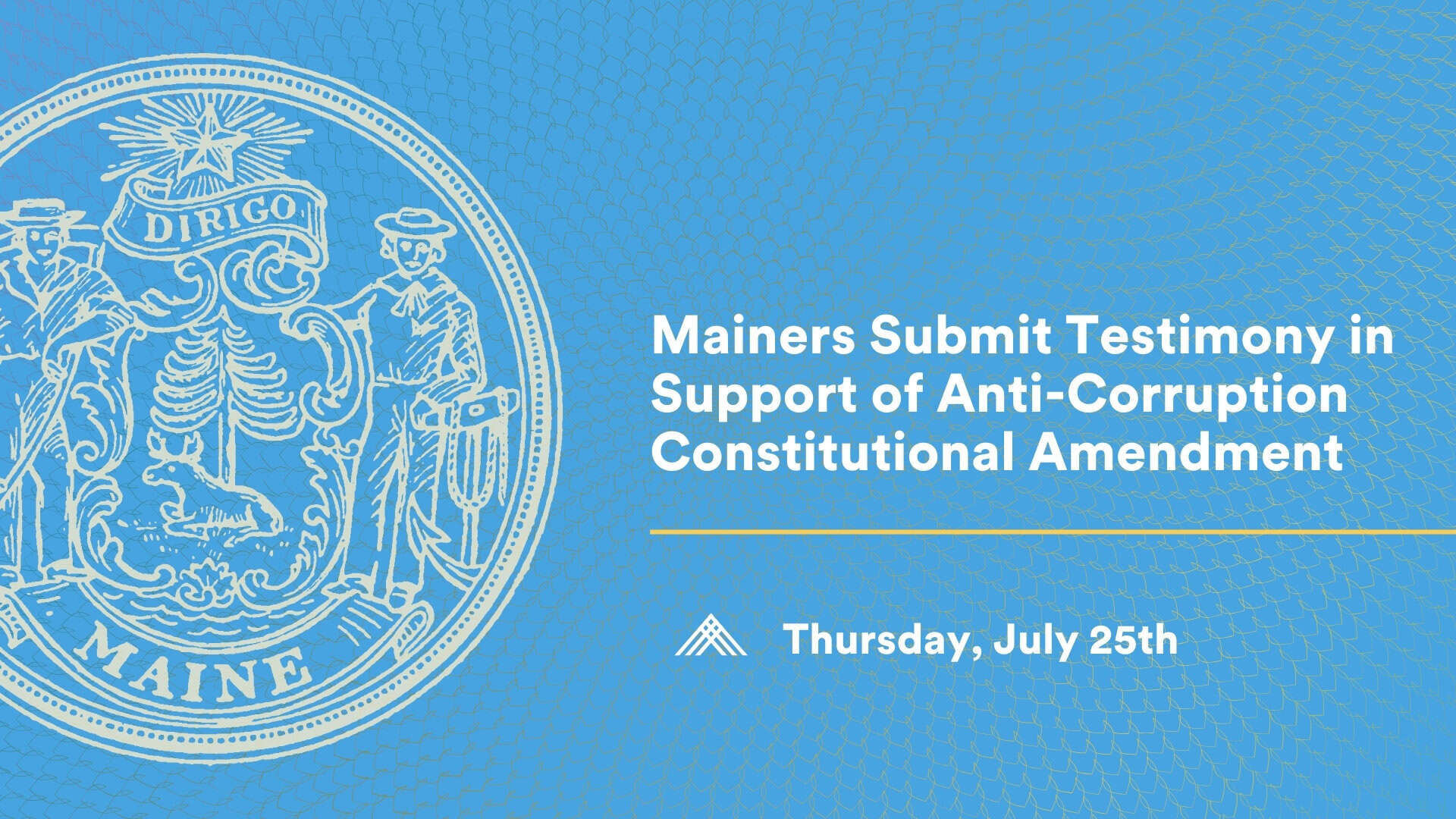We all know big money pours into political campaigns, but what are the implications of all that cash? Here are six ways big money influences our political system.
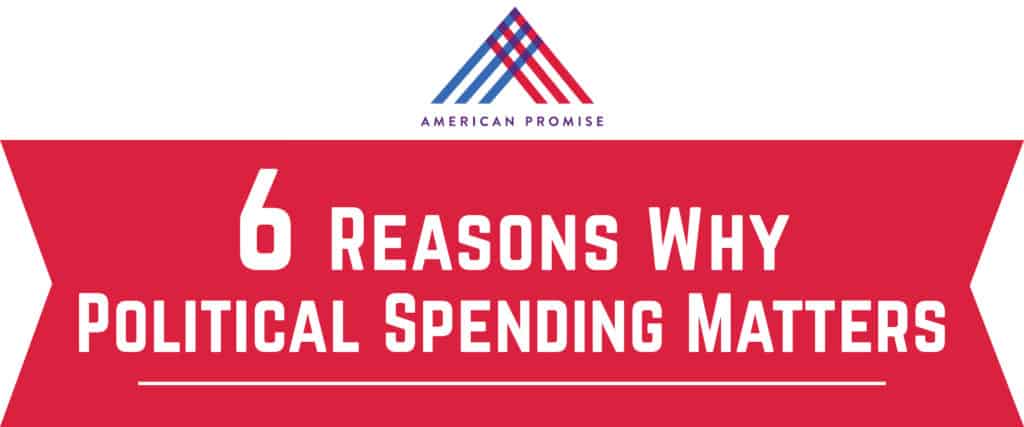
We often see headlines about big money funneling into our political process through Super PACs or wealthy individuals. But exactly how this money influences our political system—and our daily lives—can be difficult to pin down.
Big money in our political system has direct effects on all of us. Here are a few ways these big donors influence our system, and a single solution that helps address these issues.
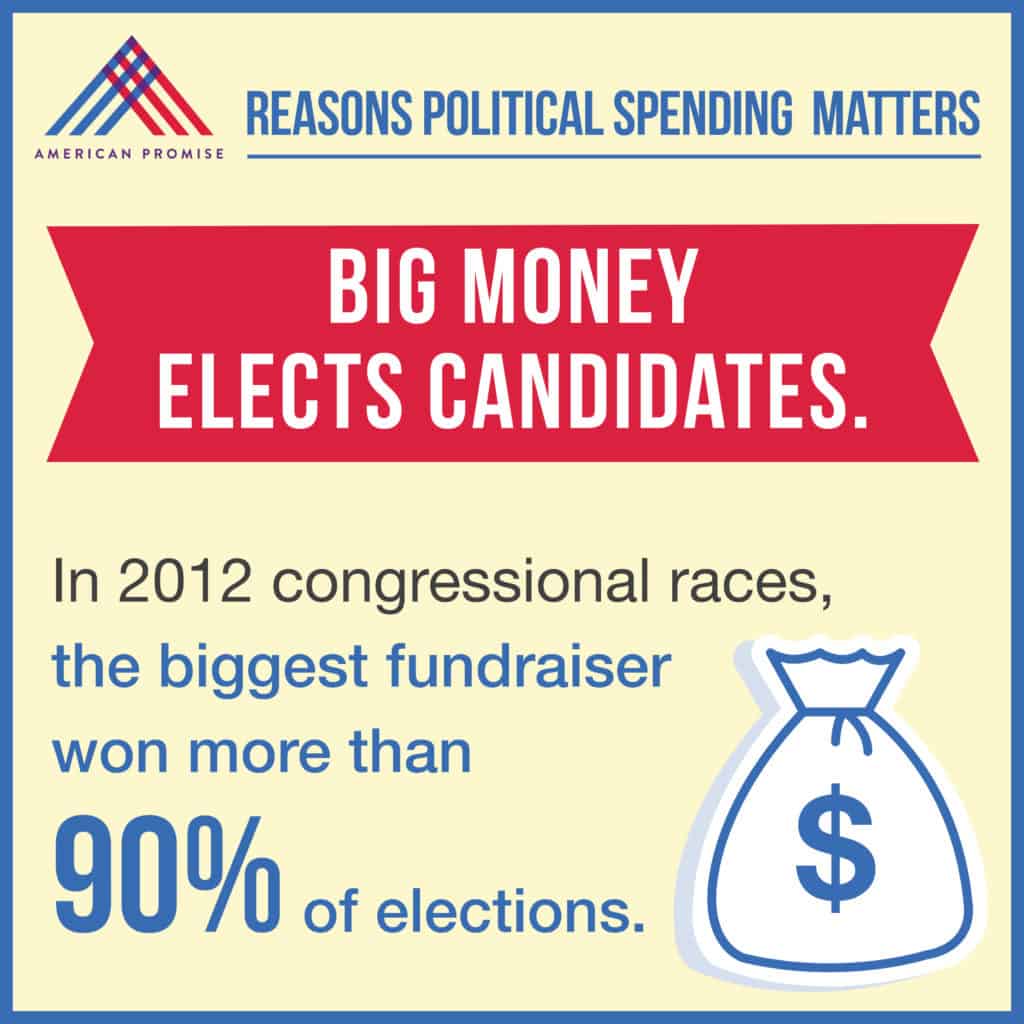
1. Electing candidates: The most obvious way big money influences our political process is by promoting or attacking candidates. Unions, corporations, special interests, PACs and Super PACs can raise and spend unlimited amounts, and spend millions on political advertising. Some analysts argue that political fundraising doesn’t reliably result in candidates winning elections—yet in reality the best fundraisers almost always win. For example, in 2012 Congressional races, the better-financed candidate won in 91 percent of races.
This spending represents a small faction of Americans, mostly wealthy special interests. The U.S. Chamber of Commerce, the nation’s largest lobbying organization for businesses, is the top-spending dark money group since Citizens United. Between January 2010 and December 2016, the Chamber of Commerce spent approximately $130 million on political advertisements, in addition to direct political contributions to candidates through its political action committee, according to a study by Issue One. The same study found that 15 groups accounted for more than 75 percent of the $800 million in political dark money spent between January 2010 and December 2016.
Most of this “dark” money is spent on attack ads. Because of this targeted political spending, some politicians are reluctant to go against the status quo or feel pressured to seek and maintain relationships with wealthy groups that donate to gain political influence.
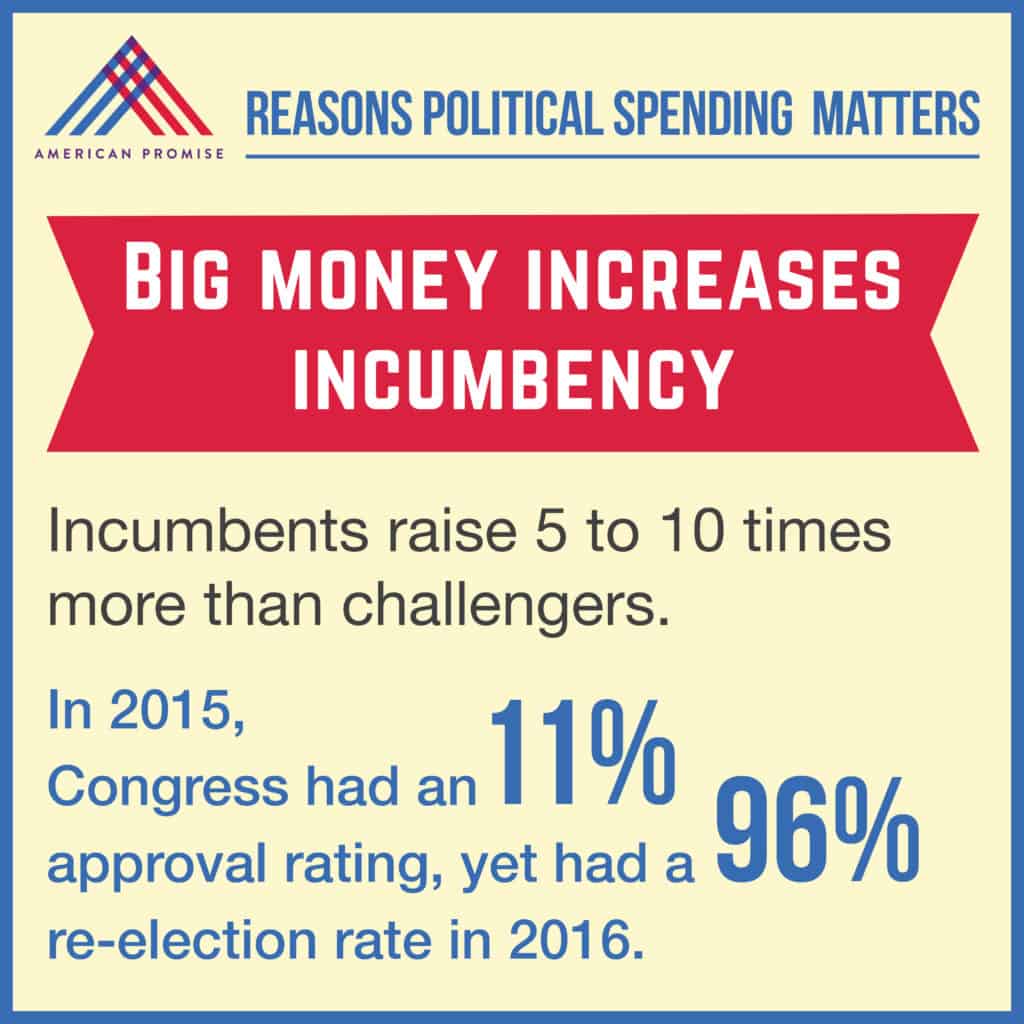
2. Increasing incumbency: In 2015 Congress had an 11 percent approval rating, but a staggering 96 percent of members of Congress who ran for office in 2016 were re-elected. Incumbents typically raise much more money than their opponents, especially from interest groups that shell out large contributions. Opensecrets.org shows that incumbents overall raised five to 10 times more than challengers for 2018 elections.
High levels of incumbency contribute to political gridlock and a lack of legislative innovation. Consistently low approval ratings highlight most Americans’ frustration with Congress. Because our big-money system can pressure elected officials to work on behalf of donors—rather than the people—to get re-elected, popular policies often do not get implemented, and people end up feeling disenfranchised.
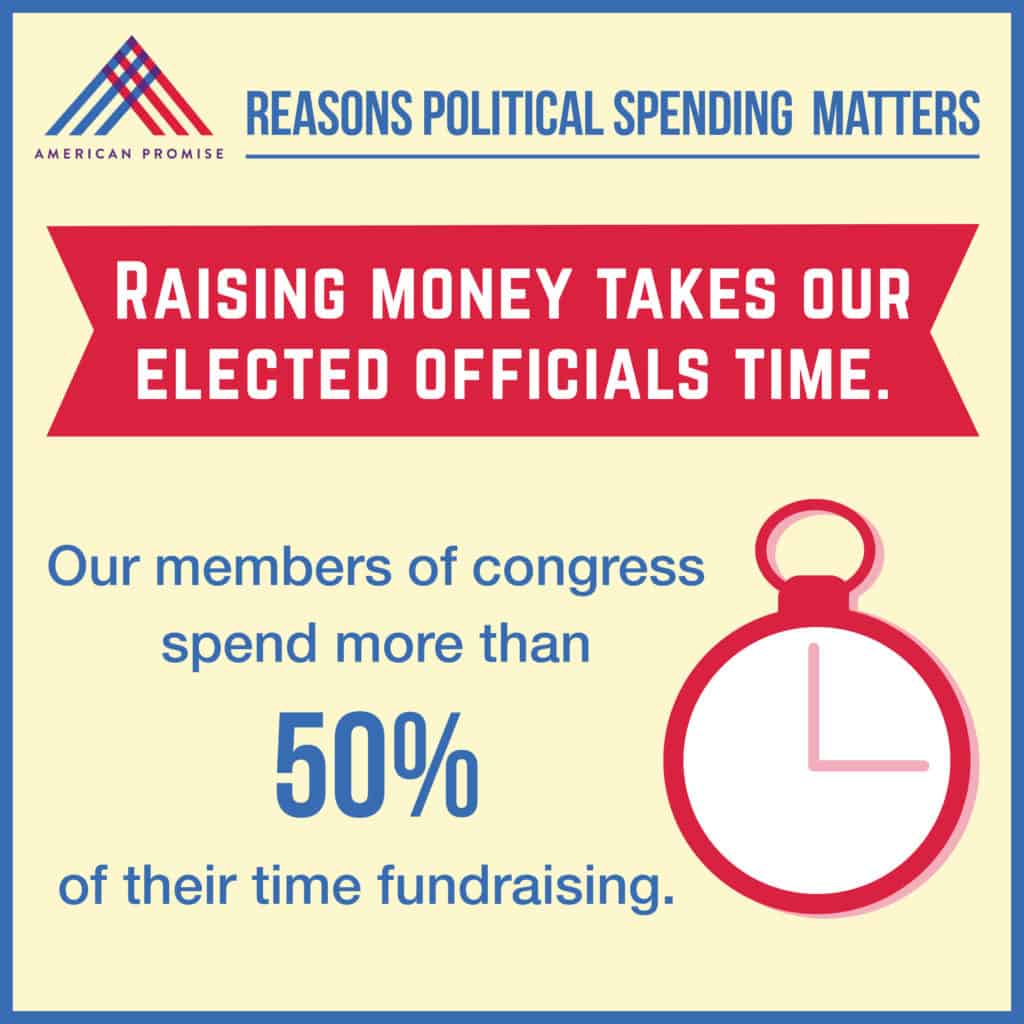
3. Consuming elected officials time: Members of Congress spend more than half of their time on the job fundraising, not crafting legislation or voting on bills. A 2016 episode of “60 Minutes” exposed the time-consuming work of fundraising and provided a glimpse into the average day of a congressional lawmaker. Lawmakers are expected to reach certain funding goals, both for themselves and for their party, or risk losing re-election. The bottom line is this: Congressional job security is more dependent on raising millions of dollars than on representing constituents.
4. Benefiting industry groups: With limited regulation on pre- and post-election spending, industry groups are able to spend dark money to get candidates elected who they believe will be receptive to their lobbying efforts once elected and enact policies that are favorable to the industry groups. The American Petroleum Institute (API), the Motion Picture Association of America (MPAA) and Pharmaceutical Research and Manufacturers of America (PhRMA) are among many industry organizations that contribute to dark money groups, according to the Issue One study. Between July 2009 and June 2017, PhRMA alone contributed $12 million to the top dark money group American Action Network—making the drug lobby this dark money group’s top known donor.
According to opensecrets.org, the pharmaceutical and health products industry spends by far the most on lobbying—nearly $4 billion between 1998 and 2018. Other top lobbying spenders include the insurance industry, electric utilities industry, business associations industry, electronics manufacturing and equipment industry, and oil and gas industry, all of which spent over $2 billion on lobbying between 1998 and 2018.
5. Limiting competition and building monopolies: In this article from The Nation, Nobel Prize-winning economist Joseph Stiglitz shares the many ways increasing market power has political consequences. When large companies build monopolies, they artificially reduce competition. Couple this with the increasing role money plays in politics, and we see corporations working to influence laws intended to promote economic competition.
In the United States, six companies—AT&T, Disney, 21st Century Fox, Comcast, CBS and Viacom—control almost all media. In the food industry, it’s 10 companies: Nestle, Coca-Cola, PepsiCo, Unilever, Danone, Mars, Mondelez, Associated British Foods, Kellogg’s and General Mills. Stiglitz argues that this increasing monopolization harms both workers and the economy.
6. Influencing elections of judges: Elections of judges from the local level all the way to state Supreme Courts are being bankrolled by big money groups. Often, these groups are also dark money groups, so the public does not know who is backing nominees or why. According to the Brennan Center for Justice, big money groups spent $27.8 million on state Supreme Court elections in the 2015-16 election cycle. The Brennan Center also found the advertisements that these groups funded were mostly attack ads that portrayed judges in misleading ways.
Does spending on judges pay off? According to a June 2017 analysis by UCLA law professor Adam Winkler, the U.S. Supreme Court sided with big businesses in 74 percent of cases these groups were involved in.
Fixing the Problem
While numerous policies have been proposed to address each of these issues individually, one solution will enable us to address them simultaneously: the 28th Amendment, which focuses on the root of the problem by limiting big money in politics.
Allowing Congress to set campaign contribution limits through passage of the amendment will reduce the influence big money groups can exercise over our politicians. To get elected, candidates will no longer be pressured to appeal to the wealthiest among us; they will have to focus on their constituents. This change will encourage legislative action on policies with widespread support, and we will see more laws that represent the will of the people rather than the interests of big money.
We need the 28th Amendment, and to get the amendment passed, we need grassroots action. There are a number of ways to get involved.
Click here to learn how to form or join an American Promise Association in your area. American Promise Associations help drum up support on the local level and can build momentum behind the 28th Amendment through the passage of local and state resolutions calling for the amendment.
Click here to learn about our candidate pledge. American Promise is asking candidates and elected officials to sign a pledge affirming their support for the 28th Amendment
Click here to sign our petition affirming your support for the 28th Amendment. We need to show our fellow Americans just how big this movement is and encourage everyone to join.



